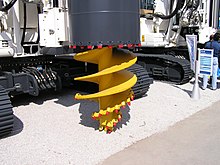Geotechnical engineering
scientific study of earth materials in engineering problems; branch of civil engineering concerned with the engineering behavior of earth materials
Geotechnical engineering is an important subset of civil engineering dealing with engineering performance of earth materials. Geotechnical engineering uses principles of soil and rock mechanics to determine:

- subsurface conditions and materials;
- relevant physical/mechanical and chemical properties of these materials;
- stability of natural slopes and man-made soil deposits;
- risks posed by site conditions;
to design:
- earthworks;
- structure foundations;
and to monitor:
- site conditions;
- earthwork and foundation construction.[1][2]
Foundations built for above-ground structures include shallow and deep foundations. Retaining structures include earth-filled dams and retaining walls.
Wikimedia Commons has media related to Geotechnical engineering.
Notes
change- ↑ Terzaghi, K., Peck, R.B. and Mesri, G. (1996), Soil Mechanics in Engineering Practice 3rd Ed., John Wiley & Sons, Inc. ISBN 0-471-08658-4
- ↑ Holtz, R. and Kovacs, W. (1981), An Introduction to Geotechnical Engineering, Prentice-Hall, Inc. ISBN 0-13-484394-0